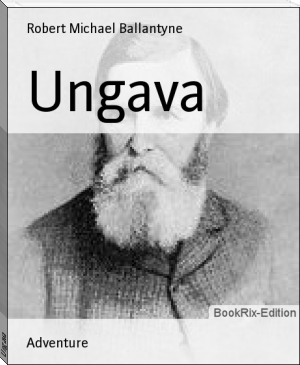Ungava - Robert Michael Ballantyne (distant reading txt) 📗

- Author: Robert Michael Ballantyne
Book online «Ungava - Robert Michael Ballantyne (distant reading txt) 📗». Author Robert Michael Ballantyne
It is a custom among the Esquimaux to consider every animal that is killed as the common property of all--the successful hunter being entitled to all the titbits, besides his portion of the equal dividend; so that Annatock knew he had only to give the signal, and every able-bodied man in the village, and not a few of the women and children, would descend like vultures on the spoil. Jumping into his sledge, he stretched out his exhausted frame at full length beside Edith, and committed the whip to Peetoot.
"I'm so glad," cried Edith, with a beaming face, "that we have killed this beast. The poor people will have plenty to eat now."
"Ha! ha! _ha_!" roared Peetoot, giving increased emphasis to each successive shout, and prolonging the last into a yell of delight, as he cracked the ponderous whip from side to side like a volley of pistolry.
"O Peetoot!" exclaimed Edith, in a remonstrative tone, as the sledge swayed to and fro with the rate at which they were sweeping over the plain, "don't drive so fast; you will kill the poor dogs!"
"Ho! ho! _ho-o-o_! Eeduck!" roared the boy, aiming a shot at the leader's left ear, and bringing the thick end of the whip down on the flanks of the six hindmost dogs.
Thus, amid a volley of roars, remonstrances, yells, yelps, and pistolry, Edith and her friends scoured over the frozen sea, and swept into the Esquimau camp like a whirlwind.
CHAPTER THIRTY ONE.
ANOTHER DESPERATE BATTLE, AND A DECIDED VICTORY--THE ESQUIMAUX SUFFER A SEVERE LOSS.
The night that followed the day of which we have given an account in the last chapter was a night of rest to Edith, but not to the Esquimaux.
Scarcely allowing themselves time to harness their dogs, after the news reached them, they set off for the scene of action in a body. Every sledge was engaged, every able-bodied male and female started. None were left in camp except the sick, of whom there were few; and the aged, of whom there were fewer. While engaged in the hurried preparations for departure the women sang with delight, for they had been living on very short allowance for some weeks past, and starvation had been threatening them; so that the present success diffused among these poor creatures a universal feeling of joy. But their preparations were not numerous. A short scene of excited bustle followed Annatock's arrival, a few yells from the dogs at starting, and the deserted camp was so silent and desolate that it seemed as if human beings had not been there for centuries.
It did not continue long, however, in this state. Two or three hours later, and the first of the return parties arrived, groaning under the burdens they carried and dragged behind them. The walrus-flesh was packed on the dog-sledges; but as for the few seals that had been caught, they were sledges to themselves--cords being tied to their tails, to which a dozen natives attached themselves, and dragged the carcasses over the snow.
Peetoot, whose spirit that night seemed to be intoxicated with success, and who felt that he was the lion of the night (after Annatock!), seated himself astride of one of the dead seals, and was dragged into camp on this novel sledge, shouting a volley of unintelligible jargon at the top of his voice, in the midst of which "Eeduck" frequently resounded. At length the last lingerer arrived, and then began a feast of the most extraordinary kind. The walrus-flesh was first conveyed to the igloo of Annatock, where it was cut up and distributed among the natives. The women seemed quite frantic with joy, and went about from hut to hut embracing one another, by way of congratulation. Soon the lamps of the village were swimming with oil, the steaks stewing and roasting, the children provided with pieces of raw blubber to keep them quiet while the larger portions were being cooked, and the entire community gormandising and rejoicing as savages are wont to do when suddenly visited with plenty in the midst of starvation.
During all this scene, Edith went about from hut to hut enjoying herself. Nay, reader, be not horrified; thou knowest not the pliable and accommodating nature of humanity. Edith did not enjoy the filth by which she was surrounded--far from it; neither did she enjoy the sight of raw blubber being sucked by little babies, especially by her own favourite; but she _did_ enjoy the sight of so much plenty where, but a few hours ago, starvation had begun to threaten a visit; and she did enjoy and heartily sympathise with the undoubted and great happiness of her hospitable friends. A very savoury dish, with a due proportion of lean to the fat, cut specially to suit her taste, smoked on Eeduck's table that night, and Peetoot and the baby helped her to eat it. Really it would be a matter of nice calculation to ascertain whether Peetoot or the baby laughed most on this jovial occasion. Undoubtedly the former had the best of it in regard to mere noise; nevertheless the pipe of the latter was uncommonly shrill, and at times remarkably racy and obstreperous. But as the hours flew by, the children throughout the camp generally fell asleep, while their seniors sat quietly and contentedly round their kettles and lamps, eating and slumbering by turns. The amount of food consumed was enormous, and quite beyond the belief of men accustomed to the appetites of temperate zones; but we beg them to remember that arctic frosts require to be met with arctic stimulants, and of these an immense quantity of unctuous food is the best.
Next morning the Esquimaux were up and away by daybreak, with their dogs and sledges, to bring home the remainder of the walrus-meat; for these poor people are not naturally improvident, and do not idle their time in luxurious indolence until necessity urges them forth again in search of food. In this respect they are superior to Indians, who are notoriously improvident and regardless of the morrow.
This day was signalised by another piece of success on the part of Annatock and his nephew, who went to the scene of yesterday's battle on foot. Edith remained behind, having resolved to devote herself entirely to the baby, to make up for her neglect of the previous day. On reaching the place where the walrus had been slain, Annatock cut off and bound up a portion with which he intended to return to the camp. While he was thus employed, along with a dozen or more of his countrymen, Peetoot came running towards him, saying that he thought he saw a seal lying on the ice far ahead. Having a harpoon and two spears with them, Annatock left his work and followed his nephew to the spot where it was supposed to be lying. But on reaching the place they found that it was gone, and a few bells floating at the surface of the hole showed where it had made its descent to the element below. With the characteristic indifference of a man accustomed to the vicissitudes and the disappointments of a hunter's life, the elder Esquimau uttered a grunt and turned away. But he had not proceeded more than a few paces when his eye became riveted on the track of some animal on the ice, which appeared to his practised eye to be quite fresh. Upon examination this proved to be the case, and Annatock spoke earnestly for a few minutes with his nephew. The boy appeared from his gestures to be making some determined remarks, and seemed not a little hurt at the doubting way in which his uncle shook his head. At length Peetoot seized a spear, and, turning away, followed the track of the animal with a rapid and determined air; while Annatock, grasping the other spear, followed in the boy's track.
A brisk walk of half an hour over the ice and hummocks of the sea carried them out of sight of their companions, but did not bring them up with the animal of which they were in chase. At length Peetoot halted, and stooped to scrutinise the track more attentively. As he did so an enormous white bear stalked out from behind a neighbouring hummock of ice, and after gazing at him for a second or two, turned round and walked slowly away.
The elder Esquimau cast a doubtful glance at his nephew, while he lowered the point of his spear and seemed to hesitate; but the boy did not wait. Levelling his spear, he uttered a wild shout and ran towards the animal, which instantly turned towards the approaching enemy with a look of defiance. If Annatock had entertained any doubts of his nephew's courage before, he had none now; so, casting aside all further thought on the subject, he ran forward along with him to attack the bear. This was a matter attended with much danger, however, and there was some reason in the man feeling a little uncertainty as to the courage of a youth who, he was aware, now faced a bear for the first time in his life!
At first the two hunters advanced side by side towards the fierce-looking monster, but as they drew near they separated, and approached one on the right, the other on the left of the bear. As it was determined that Annatock should give the death-wound, he went towards the left side and hung back a moment, while Peetoot advanced to the right. When about three yards distant the bear rose. The action had a powerful and visible effect upon the boy; for as polar bears are comparatively long-bodied and short-legged, their true proportions are not fully displayed until they rear on their hind legs. It seemed as if the animal actually grew taller and more enormous in the act of rising, and the boy's cheek blanched while he shrank backwards for a moment. It was only for a moment, however. A quick word of encouragement from Annatock recalled him. He stepped boldly forward as the bear was glancing savagely from side to side, uncertain which enemy to attack first, and, thrusting his lance forward, pricked it sharply





Comments (0)